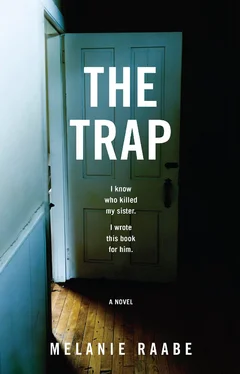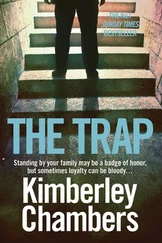I grip my teacup as if it were a lifeline and let my gaze wander around the room. It comes to rest on the bookcases to my left. One row of books in particular catches my attention — that special typeface. It looks familiar. I have a closer look and realize that they’re my books standing there on the shelf — two copies of each of my novels in strict chronological order. I swallow. I’d always thought my parents weren’t interested in my books, and I certainly didn’t think they read them. They never mentioned my writing — neither the short stories I concocted as a teenager, nor the novels I wrote in my early twenties. We never talked about my unsuccessful early work or the subsequent bestsellers. They never inquired about them or asked me to send them copies. It was a disappointment to me for years, until, in the end, I forgot about it. But now I see that they had my books all along — every one of them — and in duplicate. Maybe a set each — or spares, in case any were mislaid.
I’m about to ask, when my mother clears her throat — her surreptitious way of opening the conversation.
I had intended to be the first to talk and get it over and done with. But I can’t find the words. How do you do it? How do you ask your parents if they think you’re a murderer? And how do you bear the answer?
“Linda,” my mother begins, and immediately breaks off, swallowing a lump in her throat. “Linda, I’d like you to know that I understand you.”
My father nods emphatically.
“Yes, me too,” he says. “I mean, it came as a shock, of course. But your mother and I have talked it over and we understand why you’re doing it.”
I don’t understand.
“And I’d like to apologize,” my mother says. “For hanging up when you rang the other night. I felt awful about it — as soon as I’d done it, in fact. I even rang you back the next day, but I couldn’t get through.”
I frown. My first impulse is to disagree. I always know when someone rings. I am — in the truest sense of the word — the biggest stay-at-home on the planet. But then it comes back to me — my wrecked study, my shattered laptop, the ring binder torn to shreds in a fit of rage, the telephone ripped from the wall and dashed to pieces on the floor. Okay. But what are they talking about?
“You can do what you want, of course; it’s your story,” my mother says. “At the end of the day, it’s your experience. Only it would have been nice if you’d given us some warning. Especially”—she falters, clears her throat and continues more softly—“especially, of course, about the bit with the murder.”
I stare at my mother. She looks exhausted. But I really don’t know what she means.
“What are you talking about, Mum?” I ask.
“I’m talking about your new book,” she says. “About Blood Sisters .”
I shake my head, bewildered. My book’s not coming out for two weeks. So far, only a few advance copies have been sent to booksellers and the press. There’s been no coverage of any kind, and my parents have no contact whatsoever with the publishing industry. How do they know about my book? A dark feeling spreads through my stomach, thick and syrupy.
“How do you know about my novel?” I ask as calmly as I can. Of course, I should have been the one to let them know. But it would be a lie to pretend I’d thought of warning them. I simply forgot.
“We had a journalist here,” my father says. “Nice bloke, from a respectable paper, so your mother asked him in.”
I can feel the hairs on my neck stand on end.
“Sat right where you’re sitting now and asked us what we thought about our famous daughter making literary capital out of her sister’s murder in her next book.”
I’m falling.
“Lenzen,” I gasp.
“That was the name!” my father shouts, as if he’s been trying to remember it all along.
“We didn’t believe him at first,” my mother says, joining the conversation again. “Until he showed us a copy of the novel.”
I feel dizzy.
“Victor Lenzen was here, in this house?” I say.
My parents look at me with alarm in their eyes. I must look very pale.
“Are you all right?” my mother asks.
“Victor Lenzen was here, in this house, and told you about my book?” I ask.
“He said he was meeting you for an interview and wanted to find out a bit about your background first,” says my father. “We shouldn’t have let him in.”
“That’s why you hung up when I called,” I gasp. “You were cross about the book.”
My mother nods. I’d like to fling my arms around her neck in relief, because she’s there, because she’s my mother, because she never for a second believed I could be a murderer — not for a second. The very idea is absurd. Now that I’m sitting face-to-face with her, that is quite clear to me. But alone in my big house, it seemed entirely logical. I’ve been living in a hall of mirrors that have distorted everything in my life.
Victor Lenzen came here to find out what I knew, what my parents knew. When he realized that Mum and Dad knew nothing and that we were barely in touch with one another, he brilliantly turned the situation to his advantage.
My anger takes my breath away. I need a moment’s peace to gather my thoughts.
“Excuse me for a second,” I say, getting up.
I leave the room, feeling my parents’ eyes on my back. I lock myself in the guest bathroom, sit down on the cool tiled floor, bury my face in my hands, and try to calm down. The euphoria I had felt at finally managing to leave the house is slowly evaporating, giving way to the urgent question: What am I to do about Lenzen?
There is no evidence against him. He would have to confess. And he didn’t do that even when he was looking into the muzzle of my gun.
But that, of course, was in my house, and he had to reckon on everything being recorded. What if I were to look him up now — now that he feels safe?
I hesitate for a moment, then I take my phone and enter Julian’s number. It rings once, three times, five times, then the answering machine starts up. I leave a few words asking him to call me back and giving my mobile number, then I hang up. Might Julian still be at work? I ring the police station. A policeman I don’t know takes the call.
“This is Linda Michaelis,” I say. “Is Superintendent Schumer there?”
“No, sorry,” the man replies. “Not till tomorrow.”
Damn! I’m tempted to go ahead anyway. But I don’t want to screw things up again. I need help.
I flush the toilet and run the tap, in case my parents are still sitting tensely in the living room and can hear me. Then I leave the bathroom and go back to them. Their faces brighten when I step through the door. I notice what trouble they’re taking not to scrutinize me, not to scan my face for traces of the past years.
I sit down again. I take a sandwich, because I know it will please my mother. It’s not until I start to eat that I realize how hungry I really am. I’m about to take another when my phone rings. I don’t recognize the mobile number. Could it be Julian ringing me back? Hurriedly, I take the call.
“Hello?”
“Good evening. Is that Linda Conrads?” a male voice asks. It’s a voice I don’t know. I’m on instant alert. I get up, casting an apologetic glance at my parents, and go into the hall, closing the door behind me.
“Yes. Who’s speaking?”
“Hello, Frau Conrads, I’m glad I’ve got ahold of you. My name is Maximilian Henkel. I have your number from my colleague, Victor Lenzen.”
I’m reeling.
“Oh?” I say lamely.
I have to prop myself up against the hall wall so as not to lose my balance.
“I hope you don’t mind my disturbing you so late,” the man says, but he doesn’t wait for a response. “It’s about the interview. We were all thrilled, of course, when we received your offer of an exclusive interview. Such a shame it didn’t work out first time around. Are you better now?”
Читать дальше












